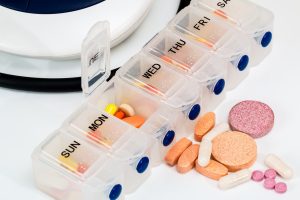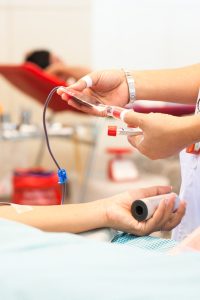Sudden Onset of HGH Deficiency
Is it possible for adult-onset HGH deficiency to strike someone who is over 60? Up until now, I've been fine, but now I have all the symptoms and it seems to have come on suddenly in the last couple of years. Does the normal aging process do this? Can it happen this fast? Or might it be an HGH problem?
 Adult-onset growth hormone deficiency (AGHD) can indeed occur in individuals over the age of 60, and it may manifest with symptoms that seem to have developed relatively quickly. While the natural aging process can lead to changes in hormone levels, including a gradual decline in growth hormone production, true AGHD onset is not caused by aging, and its extreme symptoms can be reversed by our clinic’s treatment options.
Adult-onset growth hormone deficiency (AGHD) can indeed occur in individuals over the age of 60, and it may manifest with symptoms that seem to have developed relatively quickly. While the natural aging process can lead to changes in hormone levels, including a gradual decline in growth hormone production, true AGHD onset is not caused by aging, and its extreme symptoms can be reversed by our clinic’s treatment options.
Here are some important points to consider:
- Normal Aging: As people age, there is a natural decline in growth hormone production, which can contribute to changes in body composition, muscle mass, and overall health. However, the rate and extent of this decline can vary among individuals, and not everyone will develop the more severe symptoms caused by AGHD as they age. For such people, a dramatic increase in quality of life can be achieved by the treatment options we offer – better physical performance, including athletic and sexual performance, greater sense of well-being and energy, and greater productivity and ability in many areas of life.
- Individual Variation: Some individuals may experience a more rapid decline in growth hormone production than others, which can result in symptoms that appear relatively quickly. The exact reasons for this variation are not always clear and may involve factors beyond just aging – that’s where the testing we can perfom comes in.
 Underlying Causes: AGHD can also be caused by factors other than age, such as pituitary tumors, head trauma, radiation therapy, or other medical conditions that affect the pituitary gland. These factors can lead to a sudden onset of AGHD, even in older adults.
Underlying Causes: AGHD can also be caused by factors other than age, such as pituitary tumors, head trauma, radiation therapy, or other medical conditions that affect the pituitary gland. These factors can lead to a sudden onset of AGHD, even in older adults.- Symptom Awareness: Sometimes, individuals may not fully recognize or attribute their symptoms to AGHD until they become more pronounced or interfere with daily life. It’s a good idea to test earlier rather than later. Why wait until things get much worse?
If you are experiencing symptoms that are consistent with AGHD or have concerns about your health, it is advisable to consult with the board-certified specialists at our clinic. They can conduct a thorough evaluation, including blood tests to measure growth hormone levels and other relevant markers, to determine the underlying cause of your symptoms.
Treatment options for AGHD may include growth hormone replacement therapy, which can alleviate symptoms and vastly improve overall well-being. However, it's essential to have a proper diagnosis and guidance from our specialists to address your specific needs and explore the most appropriate treatment options based on your unique health history and the results of your tests.
Do the tests involve taking pharmaceutical drugs?
 The tests for diagnosing adult-onset growth hormone deficiency (AGHD) do not involve taking pharmaceutical drugs. Instead, these tests often rely on assessing the body's natural response to specific stimuli. Here are two common tests used to diagnose AGHD:
The tests for diagnosing adult-onset growth hormone deficiency (AGHD) do not involve taking pharmaceutical drugs. Instead, these tests often rely on assessing the body's natural response to specific stimuli. Here are two common tests used to diagnose AGHD:
- Growth Hormone Stimulation Test: This test involves the administration of a harmless natural substance that should normally stimulate the release of growth hormone from the pituitary gland. Commonly used substances for stimulation include insulin, arginine, glucagon, or growth hormone-releasing hormone (GHRH). Blood samples are taken before and at specific intervals after the administration to measure the growth hormone response.
- Growth Hormone Suppression Test: In some cases, a suppression test may be performed. This test involves the administration of another harmless substance that should normally reduce the release of growth hormone. Blood samples are taken before and at specific intervals after the administration to measure growth hormone levels.
 These tests are used to assess how the pituitary gland responds to specific stimuli and whether it is producing an adequate amount of growth hormone. The goal is to determine if there is a deficiency in growth hormone production.
These tests are used to assess how the pituitary gland responds to specific stimuli and whether it is producing an adequate amount of growth hormone. The goal is to determine if there is a deficiency in growth hormone production.
It's important to note that these tests are performed under the supervision of our board-certified specialists. The tests are designed to be very, very safe and are part of the normal diagnostic process for AGHD.
Give us a call, we’d be very happy to provide you with specific information about the procedures, potential side effects, and any other relevant considerations.
- Serostim Bio-identical Hgh Injections [Last Updated On: September 22nd, 2024] [Originally Added On: July 31st, 2020]
- Smart And Simple Tips To Boosting Your Hgh Production [Last Updated On: September 16th, 2024] [Originally Added On: August 1st, 2020]
- Ten Tips For Naturally Enhancing Human Growth Hormone Production [Last Updated On: September 12th, 2024] [Originally Added On: August 4th, 2020]
- How To Safely Inject (HGH) Human Growth Hormone [Last Updated On: July 2nd, 2024] [Originally Added On: August 5th, 2020]
- Can Hgh Injections Help You Manage Your Weight More Effectively? [Last Updated On: September 11th, 2024] [Originally Added On: August 6th, 2020]
- Do Not Buy Hgh Sprays As Scams [Last Updated On: September 10th, 2024] [Originally Added On: August 8th, 2020]
- Can Human Growth Hormone Really Slow Down Aging? [Last Updated On: September 9th, 2024] [Originally Added On: August 9th, 2020]
- The Potential Side Effects Of Human Growth Hormone (HGH) [Last Updated On: February 16th, 2025] [Originally Added On: August 10th, 2020]
- Beware Hgh Scams: Only Use Bio-identical Growth Hormone [Last Updated On: July 23rd, 2024] [Originally Added On: August 13th, 2020]
- Human Growth Hormone Replacement Therapy For Hgh Deficiency [Last Updated On: October 20th, 2024] [Originally Added On: August 14th, 2020]
- How Does The Human Body Produce Human Growth Hormone? [Last Updated On: August 15th, 2024] [Originally Added On: August 17th, 2020]
- Do Not Buy Hgh Pills As Scams [Last Updated On: August 14th, 2024] [Originally Added On: August 18th, 2020]
- Hgh Injections From Mexico Are Dangerous And Illegal [Last Updated On: February 14th, 2025] [Originally Added On: August 19th, 2020]
- Human Growth Hormone Menopause Treatment [Last Updated On: February 20th, 2025] [Originally Added On: August 20th, 2020]
- Hormone Replacement Therapy Protects The Minds Of Hgh Deficient Patients [Last Updated On: August 12th, 2024] [Originally Added On: August 21st, 2020]
- Hgh Illegal Or Legal [Last Updated On: August 17th, 2024] [Originally Added On: August 22nd, 2020]
- How To Inject Hgh And Testosterone Safely And Easily [Last Updated On: August 13th, 2024] [Originally Added On: August 23rd, 2020]
- Human Growth Hormone Medical Research [Last Updated On: February 17th, 2025] [Originally Added On: August 24th, 2020]
- The Healing Properties Of Human Growth Hormone [Last Updated On: August 11th, 2024] [Originally Added On: August 25th, 2020]
- Hgh Therapy For Woman [Last Updated On: February 12th, 2025] [Originally Added On: August 26th, 2020]
- Hgh Therapy For Men [Last Updated On: July 20th, 2024] [Originally Added On: August 27th, 2020]
- How Does Age-related Hgh Decline Impact Health? [Last Updated On: February 17th, 2025] [Originally Added On: August 29th, 2020]
- Human Growth Hormone Injections Can Improve Joint Recovery After Injury [Last Updated On: August 10th, 2024] [Originally Added On: August 30th, 2020]
- The Anabolic And Bodybuilding Effects Of Bio-identical Hgh Injections [Last Updated On: August 9th, 2024] [Originally Added On: August 31st, 2020]
- Does Human Growth Hormone Really Have Healing Power? [Last Updated On: August 7th, 2024] [Originally Added On: September 1st, 2020]
- Getting HGH Growth Hormone Online [Last Updated On: August 8th, 2024] [Originally Added On: September 3rd, 2020]
- Buying Hgh [Last Updated On: September 4th, 2024] [Originally Added On: September 5th, 2020]
- Increase Your Potential With Hgh! [Last Updated On: September 3rd, 2024] [Originally Added On: September 6th, 2020]
- Can Bio-identical Hgh Help You Live The Life You Want? [Last Updated On: February 17th, 2025] [Originally Added On: September 8th, 2020]
- How Hgh Improves Libido [Last Updated On: February 17th, 2025] [Originally Added On: September 9th, 2020]
- Can Human Growth Hormone Speed Up Physical Rehabilitation [Last Updated On: October 27th, 2024] [Originally Added On: March 14th, 2021]
- A Beginner's Guide To Human Growth Hormone Replacement Therapy [Last Updated On: February 19th, 2025] [Originally Added On: March 16th, 2021]
- Can Hgh Injections Help You Live A Healthier And Happier Life? [Last Updated On: October 26th, 2024] [Originally Added On: March 19th, 2021]
- Buy Hgh Injections For An Introduction To Growth Hormone Therapy [Last Updated On: November 12th, 2022] [Originally Added On: March 20th, 2021]
- Improve Sexual Performance With Hgh Injections [Last Updated On: February 14th, 2025] [Originally Added On: May 12th, 2022]
- Understand The Risks Of Human Growth Hormone Overdose And Abuse [Last Updated On: November 24th, 2024] [Originally Added On: May 24th, 2022]
- Racing Ferraris – A Stressful Way to Earn a Living [Last Updated On: March 19th, 2025] [Originally Added On: July 12th, 2022]
- HGH: The Happiness Hormone [Last Updated On: June 25th, 2024] [Originally Added On: August 15th, 2022]
- Government, Contractor, and NGO Productivity, Efficiency, and HGH [Last Updated On: February 24th, 2025] [Originally Added On: September 7th, 2022]
- Without HGH, You Might as Well Be Dead [Last Updated On: March 11th, 2025] [Originally Added On: September 16th, 2022]
- Study Suggests Women Can Sniff Out Single Men [Last Updated On: July 24th, 2024] [Originally Added On: February 17th, 2023]
- Geographic Distribution of HGH Deficiency [Last Updated On: August 3rd, 2024] [Originally Added On: July 13th, 2023]
- The Emotional and Mental Health Effects of HGH Deficiency [Last Updated On: October 15th, 2024] [Originally Added On: September 28th, 2023]
- Understanding Hormone Replacement Therapy for Menopause [Last Updated On: February 6th, 2025] [Originally Added On: February 6th, 2025]
- Unveiling the Magic of Human Growth Hormone: A Colorful Spectrum in Medical Marvels [Last Updated On: February 16th, 2025] [Originally Added On: February 13th, 2025]
- Introduction: The Demand for Health-focused Care in Professional Environments [Last Updated On: February 15th, 2025] [Originally Added On: February 15th, 2025]
Word Count: 734







